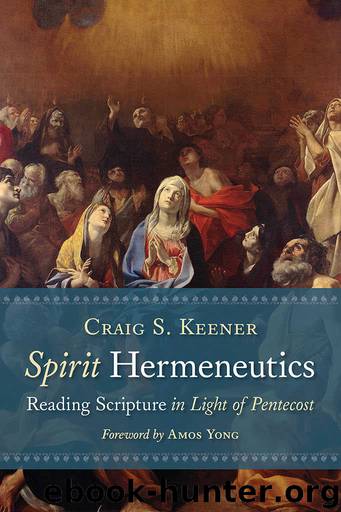Spirit Hermeneutics: Reading Scripture in Light of Pentecost by Craig S. Keener

Author:Craig S. Keener [Keener, Craig S.]
Language: eng
Format: azw
Publisher: Wm. B. Eerdmans Publishing Co.
Published: 2016-12-11T16:00:00+00:00
APPENDIX A
Some Theoretical Attempts to Bridge Understanding
Scholars have often sought to bridge the hermeneutical gaps between the ancient sense and contemporary application. Approaches to bridging the gap vary, from postmodern theological readings of the Bible as the church’s book (harking back to patristic arguments)1 to Bultmann’s existential approach and so forth. Wilhelm Dilthey recognized that everyone is shaped by their contexts,2 but he approached the possibility of understanding by presupposing some shared structures in our common humanity.3 Dilthey was one of several influences on both Rudolf Bultmann and Hans-Georg Gadamer, although both were more deeply influenced by their associate Martin Heidegger.4
Hans-Georg Gadamer rightly noted that historical contexts shape all interpreters and that interpretation is impossible without such contexts. Biases in the sense of prejudgments are inevitable;5 acknowledging them allows one to learn from and engage others who also work from biases and presuppositions. For Gadamer, all engagement with other perspectives or texts involves fusing horizons between the text’s world and our own.6 Temporal distance does exist, requiring the most competent readers to learn languages and so forth,7 but, with Aristotle, one must relate the text to one’s situation.8
Bultmann wanted to make New Testament theology relevant to a twentieth-century world.9 Wedding it to a particular twentieth-century approach, however, would ultimately doom Bultmann’s approach to the same fate as earlier attempts to conform Jesus to the dominant values of the interpreters’ era.10 Most scholars agree that the early Heidegger was a major influence on the thought of Rudolf Bultmann,11 though Bultmann thought that Heidegger instead discovered a picture that accords with what Bultmann found in the NT.12 Bultmann viewed existential interpretation not as a bias, but as a necessary perspective, like any other approach to history.13 He insisted on beginning with grammatical, formal, and historical analysis,14 so long as one recognized the role of preunderstanding in any interpretive work.15
Bultmann’s philosophic assumptions, however, shaped not only how he presented his exegetical results but also the limitations on his academic theology. Although Bultmann rejects Barth’s charges that the former’s theology is anthropocentric rather than theocentric,16 Bultmann argues that philosophy and theology both have humanity as their object.17
More problematic is his understanding of history. Although God has acted decisively in Christ,18 Bultmann views this acting as existential and not historical.19 Explaining theology to an antisupernatural world, Bultmann accepts rather than challenges its premise; thus no mature person can “seriously maintain” the New Testament worldview.20 For him, whatever involves supernatural forces is “myth”;21 the historical continuum cannot be interrupted by supernatural interventions.22
Many scholars recognize the reuse of some “mythical” language and imagery in the New Testament, perhaps most obviously in such symbolism as Rev 12:1–4. In such cases, one might describe “demythologization” as translation from one genre to another, rather than creating a new sense unintelligible to the ideal authors’ ideal contexts. Does one use modern criteria, freighted with their own cultural baggage, to determine what is “myth”?
For Bultmann, myth often demands an existential interpretation,23 but this is not the only way to appropriate myth, especially where the original sense points in a different direction.
Download
This site does not store any files on its server. We only index and link to content provided by other sites. Please contact the content providers to delete copyright contents if any and email us, we'll remove relevant links or contents immediately.
| Exegesis & Hermeneutics | New Testament |
| Old Testament |
The Five People You Meet in Heaven by Mitch Albom(3545)
The Secret Power of Speaking God's Word by Joyce Meyer(3141)
Real Sex by Lauren F. Winner(3000)
Name Book, The: Over 10,000 Names--Their Meanings, Origins, and Spiritual Significance by Astoria Dorothy(2962)
The Holy Spirit by Billy Graham(2932)
0041152001443424520 .pdf by Unknown(2832)
How The Mind Works by Steven Pinker(2801)
ESV Study Bible by Crossway(2768)
Ancient Worlds by Michael Scott(2661)
Churchill by Paul Johnson(2564)
The Meaning of the Library by unknow(2552)
The ESV Study Bible by Crossway Bibles(2543)
The Gnostic Gospels by Pagels Elaine(2515)
MOSES THE EGYPTIAN by Jan Assmann(2406)
Jesus by Paul Johnson(2347)
City of Stairs by Robert Jackson Bennett(2335)
The Complete Dead Sea Scrolls in English (7th Edition) (Penguin Classics) by Geza Vermes(2268)
The Nativity by Geza Vermes(2217)
Ancient Near Eastern Thought and the Old Testament by John H. Walton(2213)
